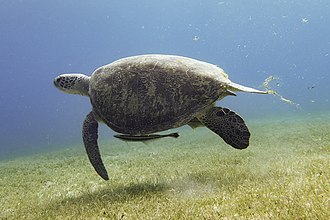
Commensalism is a long-term biological interaction (symbiosis) in which members of one species gain benefits while those of the other species neither benefit nor are harmed.[1] This is in contrast with mutualism, in which both organisms benefit from each other; amensalism, where one is harmed while the other is unaffected; and parasitism, where one is harmed and the other benefits.
The commensal (the species that benefits from the association) may obtain nutrients, shelter, support, or locomotion from the host species, which is substantially unaffected. The commensal relation is often between a larger host and a smaller commensal; the host organism is unmodified, whereas the commensal species may show great structural adaptation consistent with its habits, as in the remoras that ride attached to sharks and other fishes. Remoras feed on their hosts' fecal matter,[2] while pilot fish feed on the leftovers of their hosts' meals. Numerous birds perch on bodies of large mammal herbivores or feed on the insects turned up by grazing mammals.[3]
- ^ Cite error: The named reference
wilson1975was invoked but never defined (see the help page). - ^ Williams, E. H.; Mignucci-Giannoni, A. A.; Bunkley-Williams, L.; Bonde, R. K.; Self-Sullivan, C.; Preen, A.; Cockcroft, V. G. (2003). "Echeneid-sirenian associations, with information on sharksucker diet". Journal of Fish Biology. 63 (5): 1176–1183. Bibcode:2003JFBio..63.1176W. doi:10.1046/j.1095-8649.2003.00236.x. ISSN 0022-1112.
- ^ Cite error: The named reference
pmid29576981was invoked but never defined (see the help page).